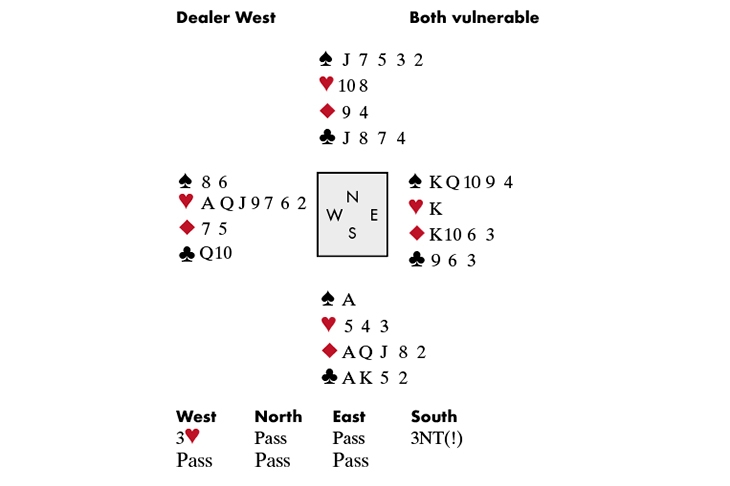It’s so much easier to play bridge well when luck is on your side. You’ve just doubled your opponents and collected a huge penalty, or made a grand slam on a finesse — and suddenly you start playing like Helgemo, with sharpened wits and perfect judgment. Luck breeds luck, and you don’t have to be a neuroscientist to figure it out: the brain works significantly better when you’re feeling positive. The converse is also true, of course. Once you’ve had some bad luck or made a silly mistake, everything starts going downhill. Why? Because being demoralised impairs your memory and decision-making skills.
The great challenge is to stay positive whatever happens — and that is the mindset of all top players. They approach every hand not with lowered spirits but single-minded determination — even when prospects look dire. Here’s a favourite example, played by Phil King during a Rosunblum Cup some years ago (see diagram).
Phil bid a brave 3NT. Maybe his partner had a stop; maybe West wouldn’t lead hearts… West kicked off with the ♠8. Phil won and cashed the ♣AK — West’s ♣Q was a welcome sight. Next he crossed to dummy’s ♣J and played the ◆9. East covered with the ◆10 (not best). He won with the ◆Q, crossed back to the ♣8 (East pitching a spade) and finessed again. Were diamonds 3-3? That would make West’s ♠8 a singleton, which Phil thought unlikely. Why didn’t West lead a heart? Because he was missing an honour — surely the ♥K. So Phil made the bold play of a low heart from hand! West played the ♥J — and East had to overtake with the ♥K. East cashed two spades, but then either had to lead a spade to dummy, or away from his ◆K6 into declarer’s ◆A8.






Comments